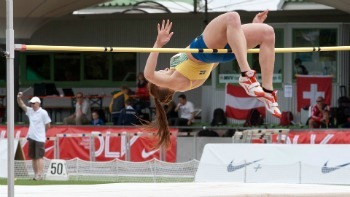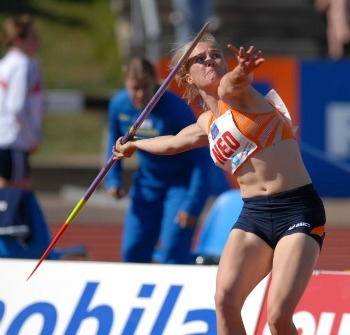Athletics is the oldest sport practice, which is known as base sport. That's because its modalities comprise the most common movements for people since antiquity: running, throwing and jumping.
This is a very important endurance test. It is the main Olympic sport, as expressed in the phrase that circulates in this medium: "The Olympic Games can only happen with Athletics. Never without him.”.
Athletics events are held in stadiums, on the field, in the mountains and on the street. THE official athletics track it must be made with synthetic flooring and have 8 lanes, each measuring 1.22 m in width.
History
Athletics emerged as a sport in Ancient Greece in 776 a. a., year that the first Olympiad of the history was realized, in the city of Olímpia.
Call of stadium for the Greeks, Coroebus was the winner of the race whose course was 200 m.
read Olympics.
However, records show that about 5,000 years ago it was already practiced in Egypt and China.
The modern athletics format dates back to the 19th century in England, and has the following official evidence:
- Races: shallow, hurdles, hurdles
- Athletic march
- Relays
- jumps
- Pitch and Releases
- Combined
In each of these tests there are a total of 20 different modes. Such modalities differ, for example, by the size of the routes and equipment used.
Athletics is an Olympic sport whose responsibility is the responsibility of the International Association of Athletics Federations, founded in 1912 in London. The sport is among the favorites for the English.
In Brazil, the organization of competitions is the responsibility of the Brazilian Athletics Confederation (CBAT).
The sport became known in Brazil in the 20th century. In 1952, Adhemar Ferreira da Silva won the first gold medal in triple jump for Brazil, which happened at the Games in Helsinki, Finland.
Races: shallow, hurdles, hurdles

Races can be short distance or rapid shooting and their course can vary between 100 and 3000 m.
The shortest shallow runs are 100 m and the longest are 10,000 m.
Hurdle races can be 110 m and 400 m, while obstacle races are 3000 m.
These are the distances for adult competitions, for both men and women.
In races, the match starts with the kick-off. According to the rule, the athlete who starts before the shooting is disqualified.
Athletic march

The athletic walk can be 20 000 m or 50 000 m for males, but only 20 000 m for females.
The rule says that athletes must run without taking their feet completely off the ground. There are referees along the course who check compliance with the rules and warn athletes, who can be eliminated after three warnings.
Relays

There are two relay events for both genders: 4x100 m and 4x400 m. They are performed between teams, each with 4 athletes.
The rule is: each of these athletes takes ¼ of the test. At the end of their course, the athlete hands a baton to the next athlete.
jumps

The jumping test can be done in two ways: vertical jump and horizontal jump.
The vertical jump events comprise high jump and pole vault.
According to the rule, in the high jump, athletes run and jump backwards on a horizontal bar.
In the pole vault, the length of the poles measures between 2.80 to 3.40 m for both men and women.
To perform them, athletes run 20 meters and, taking a boost with a flexible pole, jump over a bar. The objective is not to drop the batten, the name given to the bar.
After vertical jumps, athletes are supported by a mattress.
The horizontal jump events comprise long or long jump and triple jump.
In the long jump, athletes run and jump when they reach the established mark. On the sand floor is the mark to measure the distance obtained.
In the triple jump, the athlete takes two jumps before the final jump in the sandbox.
Pitch and Releases

Among the throwing and throwing events, there are the following types: shots with weight, hammer, disc and javelin.
The weight of the materials released varies between male and female.
In the shot put, the ball weighs 7.26 kg in the men's modality and 4 kg in the women's modality, just like the hammer.
The rule is that, with just one hand, athletes throw the weight, or hammer, as far as they can.
Discs are 2 kg for men and 1 kg for women. Darts, in turn, are 800 g for men and 600 for women.
In discus throw, athletes rotate their bodies and throw the disc away.
Combined
Decathlon is the men's race, while heptathlon is the name of the women's race.
The decathlon comprises the following events: 100, 400 and 500 meters, hurdles, long jumps, high jumps and pole jumps, shot put, discus and javelin.
The heptathlon comprises the following events: 100, 200 and 800 meters, long and high jumps, shot put and javelin.
According to the rules, in combined competitions, teams add points as they win the competitions.
Discover other sports:
- Types of sport: invasion, brand, precision, combat, net and wall
- Swimming
- Volleyball
- Soccer
- Handball
- Basketball

